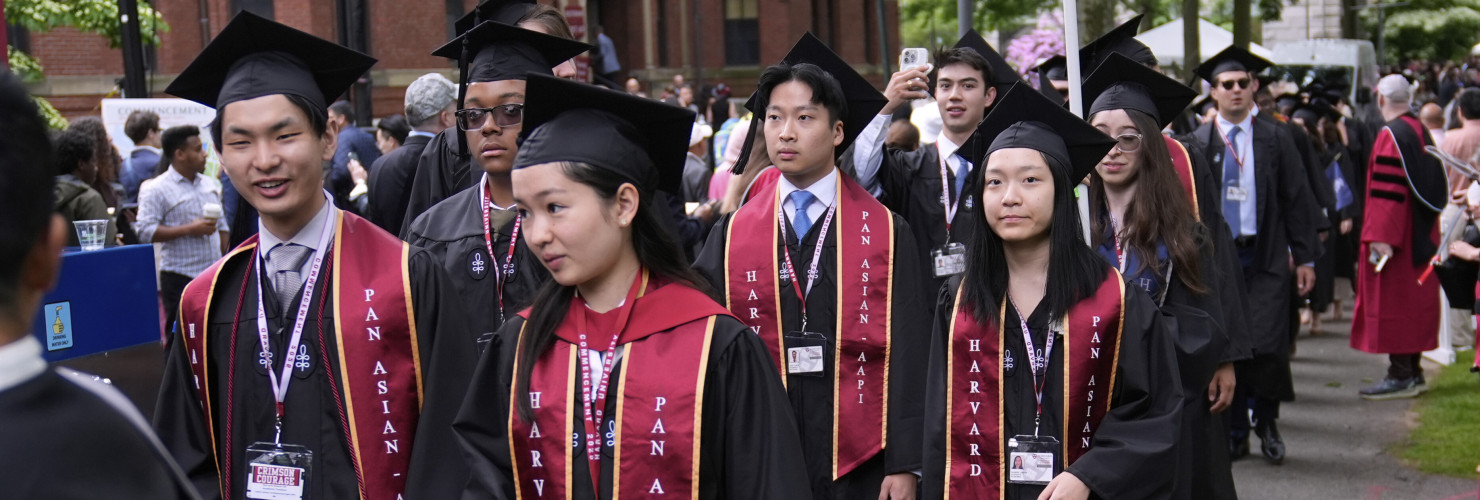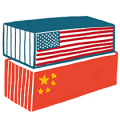

Trump's international student bans + US-China relations + Rare earths
Top story
Trump’s international student bans open up race for talent
The US last week said it would “aggressively” revoke Chinese students’ visas, a move that will not only hurt Chinese students in the US but also China’s efforts to compete in critical tech fields. Around 300,000 Chinese students currently study in the US, which dominates global research and education – and could likewise suffer from a decline in international exchange.
Yet, China has little room to hit back. Since the Covid pandemic, the number of American students there has dropped to 800, from 11,000. Tit-for-tat retaliation would also counteract Xi Jinping’s directives to turn China into a scientific superpower and a leader in global education, with educational exchange and talent acquisition at the core of the strategy.
Trump’s first administration already tried to bar Chinese students with military ties from attending US graduate schools and earlier passed a now-ceased controversial initiative to crack down on research espionage. The new visa revocations target anyone with links to the Chinese Communist Party or studying sensitive subjects, but it lacks further details, making it non-transparent and difficult to accurately enforce.
China’s foreign ministry condemned the move as discriminatory and as an undue politicization of educational exchange. Some nationalist voices are celebrating it as an opportunity to repatriate talent while curbing idolization of the American education system. And in general, it has stoked anti-American sentiment and pride in the US dependence on Chinese researchers, especially in highly specialized fields such as AI. This gives China an opportunity to leverage the US’ self-inflicted reputational blow and attract more talent.
But many students who have spent years working toward acceptance at a US university are distraught, especially in the face of dire employment prospects at home and abroad. Volatile US policies are pushing Chinese students and researchers to other, more stable countries, including the UK, Canada, and Japan.
Universities elsewhere are seizing this opportunity. The Hong Kong University of Science and Technology, for example, started offering unconditional admission to affected Harvard students, with other universities in Japan, South Korea, and Malaysia following suit. Meanwhile, Berlin launched ad campaigns in major US media, inviting affected students to enroll and joining a global race for top talent.
"A blanket ban on Chinese students creates a hurdle for China’s technological ambitions, but it also risks drying up the US’ top talent pool – ultimately, a loss for both countries."
Daria Impiombato, Senior Analyst at MERICS
Media coverage and sources:
- BBC: Trump administration to “aggressively” revoke visas of Chinese students
- Sina.com (CN): 外交部回应美政府拿哈佛开刀:反对将教育合作政治化 (Foreign Ministry responds to US government targeting Harvard: Opposes politicization of educational cooperation)
- China File: Can the US find a balance between scientific openness and security?
- The Hong Kong University of Science and Technology: HKUST opens doors to Harvard students amid global academic shifts
- Der Tagesspiegel: „Dürfen wir Ihnen etwas Freiheit zurückgeben?“: Berlin wirbt in den USA um Wissenschaftler
METRIX
257 million
This is the amount of reals (some 40 million EUR) that the Brazilian government is seeking in damages in a lawsuit against the Chinese electric vehicle (EV) giant BYD and two of its contractors. Prosecutors have accused the companies of creating “slavery-like conditions” at a factory construction site employing 220 Chinese workers. The lawsuit comes at a time when Chinese EV manufacturers are facing growing restrictions in foreign countries; Brazil is one of BYD’s largest overseas markets. (Source: BBC)
Topics
China keeps a low profile at Shangri-La Dialogue as tensions with US worsen
China’s Defense Minister Dong Jun skipped Asia’s largest defense forum for the first time since 2019, in a display of the widening cracks between Beijing and Washington that could have serious implications for the Indo-Pacific. The move was likely a strategic choice to avoid high-level interaction with the Americans while the broader US-China dispute remains unsettled and continues to deteriorate.
But in bowing out, Beijing didn’t merely miss an opportunity for a high-level meeting with US Secretary of Defense Pete Hegseth, it also allowed the US to control the narrative and make a forceful case against China’s behavior and ambitions in the region. Hegseth accused China of aspiring to become a hegemonic power in the Indo-Pacific and highlighted the potentially “imminent” threat China poses to Taiwan, making clear that the US will fight decisively if China attacks.
It wasn’t until the following day that spokespersons for China’s Ministry of Foreign Affairs and Ministry of Defense attacked Hegseth’s “defamatory” allegations and warned the US not to “play with fire” on the Taiwan question.
As China steps up pressure on Taiwan and elsewhere in the region, and the US refocuses its attention on the Indo-Pacific theater, the risk of confrontation there will continue to rise. The lack of trust and communication at the highest levels between the US and China will only increase the risk of escalation.
“Beijing is bracing for worsening tensions with the US and a more confrontational environment in the Indo-Pacific. Its prioritization of forums where it can make its case to more receptive audiences is part of an attempt to strengthen its own partnerships and weaken the United States’.”
Helena Legarda, Lead Analyst at MERICS
Media coverage and sources:
New stage of the US-China trade war will be less seismic, but more chaotic
The US-China trade war is entering a new phase as US courts and economic reality restrain Donald Trump’s broad-based tariffs. The US President’s wish to land China a knock-out punch will likely be replaced by erratic measures that deal a flurry of lighter blows. The May 12th trade war “ceasefire” agreement between Washington and Beijing is already breaking down as each side accuses the other of violating its terms. China is pointing the finger at the US for new export controls and threats to Chinese students, while the US notes that China is maintaining its export controls on rare earths.
The White House will impose trade restrictions, but it will not go back to sky-scraping tariffs that were economically unsustainable– and which may no longer be legal in many cases, according to US courts. What is likely to replace them is an erratic approach that will target specific trade and technology sectors, as well as Chinese students. Where the Trump team had previously been united on broad-based tariffs, now different players in the administration are likely to advance measures on many different fronts using more specific tools, like carefully chosen export controls or restrictions on imports.
China is likely to remain defensive and responsive, as it has throughout the last seven years. Beijing’s toolkit is smaller than Washington’s, but the number of tools at its disposal is growing. Finally, China is likely to offer a more coordinated response than the US and will strive to tactically counter US efforts while remaining focused on its broader strategic goals of decreasing dependencies on US tech and American consumers.
“A renewed escalation resulting in extremely high tariffs on all goods is unlikely, given that the US and China have demonstrated that they have no appetite for the consequences. Instead, Trump seems to be calling on his team to find and advance other points of leverage with China. Meanwhile, Xi is likely to seek ways to buy as much time as possible while pursuing his ambitions for China’s self-reliance.”
Jacob Gunter, Head of Program Economy and Industry at MERICS
Media coverage and sources:
- The White House: Sunday Shows: President Trump is supercharging the US economy
- BBC: China says US has “severely violated” tariffs truce
- ChinaNews (CN): 美方称中方违反日内瓦经贸会谈共识 中方驳斥:停止散布虚假信息 (US claims China violated the consensus reached at Geneva economic and trade talks: China refutes the claim and calls for end to dissemination of false information)
China’s export restrictions on rare earths threaten Europe’s economic security
European auto part suppliers have been forced to halt some production lines following China’s recent export controls on seven rare earth elements (REEs) and permanent magnets, announced on April 4. A response to the latest US tariffs and technology export controls, the new licensing requirements showcase China’s continued challenge to Europe’s supply chain security and strategic autonomy. A recent China Daily article hinted at leniency for European semiconductor firms, suggesting that Beijing may be mulling concessions, but it was swiftly deleted.
Europe’s high-tech and green industries from auto to wind depend on REEs, especially critical components like magnets. China controls over 90 percent of global REE processing and pursues a two-pronged strategy. First, Beijing can use this dominance as a geostrategic tool – in this case, to hit back at US measures. Second, by tightening exports of essential REE processing technology and know-how, as it did in December 2023, China also seeks to preserve its leverage. By carefully managing global supply, it can influence global REE prices and hinder diversification efforts, thereby undercutting competitors and keeping countries dependent.
While China has an interest in avoiding an economic war with the EU, meaning export licenses may eventually come through, its politicization of critical minerals should prompt Europe to stay the course with its de-risking strategy. Even if is not the primary target, Europe is disrupted by US-China tensions. Moreover, Beijing has clear strategic motives to restrict REEs and related technology exports, which go beyond its spat with Washington and directly clash with EU interests, challenging its resource security.
"Beijing’s strategic grip on rare earths is no longer just a market reality but also an active lever of foreign economic policy. China’s plans to dominate entire industries directly threaten European interests. The run-up to the EU-China Summit in July is now a test case for how Beijing balances coercion and cooperation to achieve its goals.”
Rebecca Arcesati, Lead Analyst at MERICS
More on the topic:
- Keeping value chains at home, MERICS Report
Media coverage and sources:
- Chinese MOFCOM (CN): 商务部 海关总署公告2025年第18号 公布对部分中重稀土相关物项实施出口管制的决定 (Announcement by MOFCOM and GAC of the implementation of export controls on certain rare earth-related items)
- China Daily (CN): 知情人士:商务部加强稀土出口管制政策宣讲 或预示放松对欧芯片企业出口 (Insiders: MOFCOM’s briefing on strengthening rare earth export control policy, possibly indicates a relaxation for European chip exporters)
- Chinese MOST (CN): 中国禁止出口限制出口技术目录 (China’s Catalogue of Technologies Prohibited or Restricted from Export)
MERICS China Digest
Hong Kong curbs Tiananmen anniversary, as US and Taiwan say world must remember (Reuters)
Security was tight in Hong Kong on the 36th anniversary of Beijing’s crackdown on demonstrators in Tiananmen Square in 1989. Commemorations in the city once drew tens of thousands of people until 2020, when the National Security Law took effect. (25/06/04)
Far From Home: Uyghur workers in factories supplying global brands (New York Times)
An investigative report by the New York Times, Der Spiegel and The Bureau of Investigative Journalism revealed how a scheme involves the forced shipment of Xinjiang ethnic minorities to factories in other parts of the country, with some supplying global brands. (25/05/29)
China’s Henan province seems to be censoring a large number of websites that are beyond the content blocked by the national-level Great Firewall, according to a new investigation from “Great Firewall Report” that warns of the emergence of regional online censorship in China. (25/05/15)
Situated at the Enping 15-1 platform in the Pearl River Mouth Basin, the project which officially launched last month captures carbon dioxide produced during oil development, purifies it and pressurizes it to a supercritical state to inject it into underground reservoirs. (25/05/22)
We would like to thank our research interns Anna Cruz and Ariane Kolden for their contributions to this issue of MERICS China Essentials.
